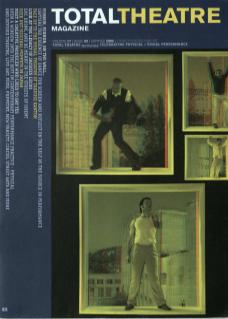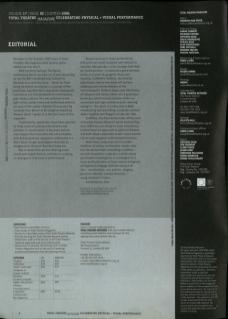Welcome to the Summer 2005 issue of Total Theatre, the magazine that reaches parts others can't or won't.
With the Jerry Springer The Opera controversy set to run and run, it was reassuring to see the BBC standing firmly behind its decision to screen the show which, far from being an attack on religion, is a parody of the particular way that life's important experiences and values are trivialised within contemporary pop-media culture. This was welcome in the light of the rather timid and ineffectual defence in much of the media of Behzti (Dishonour) by Gurpreet Kaur Bhatti at Birmingham Repertory Theatre, which I spoke of in the last issue of this magazine.
Traditionally, performers have been advised to steer clear of working with children and animals. In recent times, it has been politics and religion that have been the untouchables, with British political awareness suffocated in a New Labour stupor and religion deemed too dangerous in the post-Rushdie Fatwa era.
But it seems that we are entering a new era of politicised theatre, and there's a strong re-emergence of parody in performance.
Anyone wishing to make performance with political intent would be well advised to consider that parody is a far stronger tool than po-faced polemic. I witnessed a good example of this in a work-in-progress show seen recently, SixOfOne's Skinless, directed by John Wright (whose new book will explore contemporary interpretations of the Carnivalesque). Skinless takes real-life stories of refugees and weaves them into a grotesque burlesque, which recasts torture victims as comedians and rape victims as pole-dancing showgirls. The result is a show that is both entertaining and disturbing, a volatile cocktail where laughter and disgust sit side-by-side.
SixOfOne, like Para Active (who will be seen in Camden People Theatre's Sprint festival May-June 2005) are not afraid to court controversy in their head-on approach to political theatre, and both these companies tackle issues around racism and migration with irreverent humour.
Both these companies are in a noble tradition of artists and theatre-makers who live the dictum that ‘everything is politics' – we look forward to a new era in which empty postmodern knowingness is exchanged for a more profound sense of irony and an energised willingness to engage with the essence of life – relationships, sex, politics, religion, personal identity, cultural diversity – using whatever it takes.

